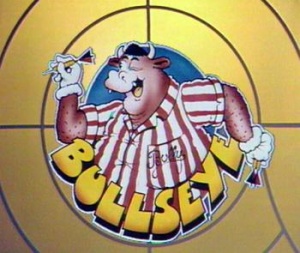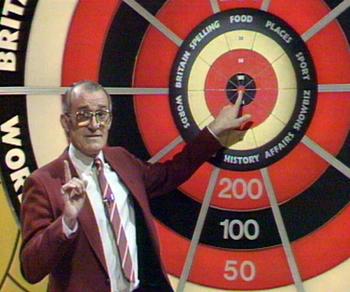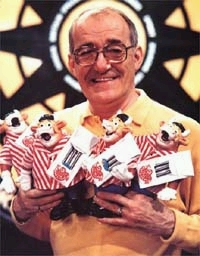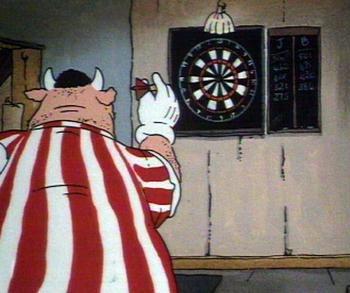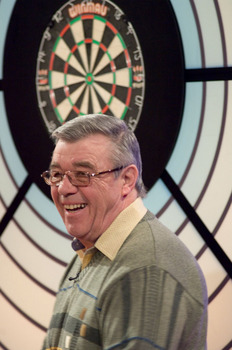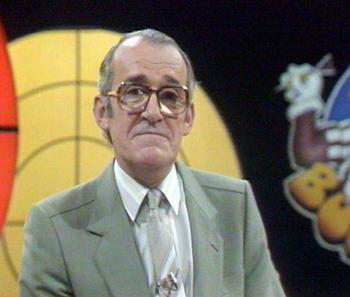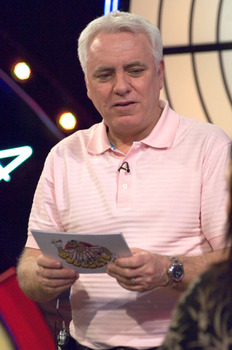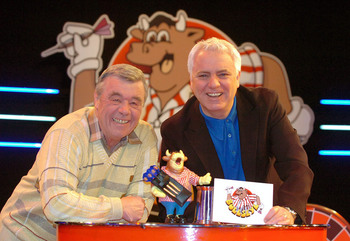Bullseye
(→Trivia) |
(→Broadcast: corrected the date of the first Alan's Epic Bullseye episode - an Epic PYCR episode aired on 27 June 2020) |
||
| (110 intermediate revisions not shown) | |||
| Line 1: | Line 1: | ||
| - | <div class="image">[[ | + | <div class="image">[[File:Bullseye logo.jpg|300px]]</div> |
| + | |||
<div class="box"> | <div class="box"> | ||
| + | |||
== Host == | == Host == | ||
| - | [[Jim Bowen]] | + | [[Jim Bowen]] (1981-95) |
| - | [[Ant McPartlin|Ant]] & | + | [[Ant McPartlin|Ant]] & [[Declan Donnelly|Dec]] (2005 ''Gameshow Marathon'' one-off) |
| - | [[Dave Spikey]] ( | + | [[Dave Spikey]] (2006) |
| - | [[Vernon Kay]] (2007 | + | [[Vernon Kay]] (2007 ''Gameshow Marathon'' one-off) |
| + | |||
| + | [[Alan Carr]] (2020-22 ''Epic Gameshow'' episodes) | ||
== Co-hosts == | == Co-hosts == | ||
| - | + | Voiceover: [[Nick Owen]] (1981-82) | |
| + | |||
| + | Scorers:<br> | ||
| + | [[Tony Green]] (1982-95, 2006 and ''Gameshow Marathon'' one-offs)<br> | ||
| + | Richard Ashdown (''Epic Gameshow'' episodes) | ||
| + | |||
| + | Hostess: [[Marti Caine]] (1988 Christmas special) | ||
== Broadcast == | == Broadcast == | ||
| - | ATV for ITV, 28 September to 21 December 1981 (13 episodes in 1 series | + | ATV in association with Chatsworth Television for ITV, 28 September to 21 December 1981 (13 episodes in 1 series) |
| - | + | ||
| - | + | ||
| - | + | ||
| - | + | ||
| - | + | ||
| - | + | ||
| - | + | ||
| - | + | ||
| - | + | ||
| - | + | ||
| - | + | ||
| - | + | ||
| - | + | Central in association with Chatsworth Television for ITV, 10 October 1982 to 8 July 1995 (309 episodes in 13 series + 10 specials) | |
| - | + | Co-produced by Carlton UK Productions, 1995 | |
| - | + | Granada and Thames for ITV1, 22 October 2005 (''[[Gameshow Marathon]]'' one-off) | |
| - | + | Granada for Challenge, 17 April to 22 September 2006 (30 episodes in 1 series) | |
| - | + | ITV Productions and TalkbackThames for ITV1, 19 May 2007 (''[[Gameshow Marathon]]'' one-off) | |
| - | + | Talkback for ITV, 4 July 2020, 10 April and 8 May 2021, 25 June and 16 July 2022 (''[[Epic Gameshow]]'' episodes) | |
| - | + | </div> | |
| - | == | + | == Synopsis == |
| - | + | Three pairs of contestants, an amateur dart player and a non-dart player, would compete in three rounds. | |
| - | <div class="image"> | + | <div class="image">[[File:Bullseye chat.jpg]]''[[Jim Bowen]] interviews the contestants. The Round 1 dartboard can be seen in the background.''</div> |
| - | + | ===Take aim...=== | |
| + | |||
| + | In Round 1, the dart player would aim for one of ten segments on a specifically constructed board. Money was won depending on how close the dart came to hitting the bullseye - but only if the dart landed in the category nominated by the non-dart player. More money could be won by the non-dart player answering a question on the category associated with the segment. Once a category had gone, the dart player had to avoid it otherwise no money could be won in subsequent throws. | ||
| - | + | <div class="image">[[File:Bullseye jimpointing.jpg]]''Bowen pointing the bull at the dartboard.''</div> | |
| - | + | After each player had thrown one dart three times, the couple with the least amount of money retired. (This final rule was changed in series eight so that two teams were eliminated at the end of Round 2 to give the lagging team a chance to catch up.) The consolation prize was a Bendy Bully, a toy version of the show's portly bovine mascot. Oh, and some darts, tankards (goblets for the ladies), and in the early shows, before the Bendy Bullies, chalk-holders (don't ask!). | |
| - | + | <div class="image">[[File:Bullseye_bullies.jpg]]Bowen doles out the consolation prizes - Bendy Bullies''</div> | |
| - | In Round 2, a standard dart board was used. Each dart-player threw three darts. The highest scoring dart player would win the right for his partner to answer a question, the reward being the dart player's score in (British) pounds. | + | In Round 2, a standard dart board was used. Each dart-player threw three darts. The highest scoring dart player would win the right for his partner to answer a question, the reward being the dart player's score in (British) pounds from series 2 onwards. In the very first series, the winning score allowed their partner a choice of three questions: one worth £25, one worth £50 and one worth £101. |
===What's Bully got in store tonight?=== | ===What's Bully got in store tonight?=== | ||
| Line 65: | Line 65: | ||
After an interlude where a professional darts player (or sometimes a celebrity from the world of showbiz, who was always given a 60-point head start) tries to throw for money for a charity (known as "Bronze Bully Time", because the professional who scored the most at the end of the series got to hold a large Bully trophy made from bronze for the year - nine darts with pounds for points going to charity, doubled if they made 301 or more), the highest scoring team went through to ''Bully's Prize Board'', another specially constructed dart board containing eight quite narrow red segments (which claimed prizes), quite large black segments (which did nothing) and a fairly large bullseye. Hitting a red segment corresponded with claiming one of eight prizes, and hitting the bullseye claimed Bully's Special Prize. | After an interlude where a professional darts player (or sometimes a celebrity from the world of showbiz, who was always given a 60-point head start) tries to throw for money for a charity (known as "Bronze Bully Time", because the professional who scored the most at the end of the series got to hold a large Bully trophy made from bronze for the year - nine darts with pounds for points going to charity, doubled if they made 301 or more), the highest scoring team went through to ''Bully's Prize Board'', another specially constructed dart board containing eight quite narrow red segments (which claimed prizes), quite large black segments (which did nothing) and a fairly large bullseye. Hitting a red segment corresponded with claiming one of eight prizes, and hitting the bullseye claimed Bully's Special Prize. | ||
| - | <div class="image"> | + | <div class="image">[[File:Bullseye titles.jpg]]''Bully, the show's mascot, attempts to throw a dart in the title sequence.''</div> |
| - | + | ||
| - | ''Bully, the show's mascot, | + | |
One jeopardy, which happened quite a lot more than you might think, occurred when a dart hit the same red segment or the bullseye twice. This caused the prize to be lost or, as the host infamously put it, ''"Keep out of the black and in to the red, There's nothing in this game for two in a bed"''. | One jeopardy, which happened quite a lot more than you might think, occurred when a dart hit the same red segment or the bullseye twice. This caused the prize to be lost or, as the host infamously put it, ''"Keep out of the black and in to the red, There's nothing in this game for two in a bed"''. | ||
| Line 73: | Line 71: | ||
===Are they going to gamble?=== | ===Are they going to gamble?=== | ||
| - | + | After Jim had listed the prizes that the couple had won, the couple were given the option of gambling these prizes against the Star Prize that was "hiding behind Bully". To win the gamble, they had to throw 101 or more on the standard dart board with six darts, three for the non-dart player followed by three for the dart player. From the eleventh series (1991-92) onwards, if the couple gambled, not only would their prizes be on the line, but also the money they had won in the earlier part of the show - failure meant that all they would get was their "BFH - Bus Fare Home". (The money for their charity was always safe, and rightly so, as were their Bendy Bullies, tankards/goblets and darts.) | |
| - | If the | + | If the couple decided not to gamble for the Star Prize, they were sent on their way with a round of applause, and the second-placed couple were then brought back on set and given the option of gambling their money from the earlier part of the show. If they too declined to gamble, the third-placed couple were brought back and given the same option. Almost all of the time, either of these couples would say "yes", as putting a few quid on the line to win a speedboat was less of a gamble than potentially throwing away a washing machine and a hi-fi. There were, however, two occasions when all three couples declined to gamble and happily took home what they had won, meaning that the 101 challenge was not played at all: the first occasion was in 1984, when the Star Prize was a caravan, and the second was in 1987 (though Jim incorrectly stated it was "the first time in seven series"), when the Star Prize was a dining suite. |
| - | Before the darts were thrown, it was ''de | + | Before the darts were thrown, it was ''de rigueur'' for announcer [[Tony Green]] (pictured) to say ''"Take yer time"'' more often than necessary. If they won the star prize they got to keep their money and prizes from Round 3 too. |
| - | <div class="image"> | + | <div class="image">[[File:Bullseye tonyatboard.jpg]]''Announcer, Tony Green''</div> |
| - | + | ||
| - | ''Announcer Tony Green | + | |
For their time, the prizes on Bullseye were very generous. Speedboats, cars, holidays and caravans would feature regularly. But, if the contestants failed in the final gamble, they had to see the star prize regardless - "Look at what you could have won." | For their time, the prizes on Bullseye were very generous. Speedboats, cars, holidays and caravans would feature regularly. But, if the contestants failed in the final gamble, they had to see the star prize regardless - "Look at what you could have won." | ||
| - | <div class="image"> | + | <div class="image">[[File:Bullseye jimsulking.jpg]]''No speedboat. Sad Jim.''</div> |
| - | ''"( | + | ===Super, smashing, great=== |
| + | |||
| + | ''Bullseye'' had started out life as an Autumn replacement for [[The Krypton Factor]] at 7pm on Mondays. A year later it moved to Sunday afternoons through the winter months, where it would remain for the next decade. For its final couple of series, ''Bullseye'' was moved to a graveyard slot on Saturday afternoons. Bullseye became both a game show and an institution, peaking in with 17.60 million viewers on 23 December 1984. Club comedian [[Jim Bowen]]'s style and catchphrases such as "super, smashing, great" spawned a large number of mickey-takes (not to mention the odd notable out-take on ''It'll be Alright on the Night''). | ||
| + | |||
| + | === Darting into the 21st century === | ||
| + | |||
| + | The show was revived in 2006 with [[Dave Spikey]] as host. It was certainly a very decent revival, with only a few minor tweaks, such as 'Bullseye' T-Shirts, board games and DVD games being added to the consolation prizes, the value for the bullseye being hit on the category board dropping from £200 to £150 (be fair, this was Challenge!) and the star prize now being hidden 'behind our dartboard doors' rather than 'behind Bully'. Spikey certainly proved a good host, and it was good to have Green (still wearing jumpers) return as scorer, but it seemed that the revival didn't quite click with the public in the way the original version had - they apparently missed Bowen. | ||
| + | |||
| + | <div class="image">[[File:Bullseye dave with logo.jpg]]''New host, [[Dave Spikey]] behind a contestant's podium.''</div> | ||
| + | |||
| + | A one-off revival for [[Epic Gameshow]] in 2020 featured a new final round. "101 or more in six darts" was gone, replaced by "hit these red sections on spinning dartboards". Much more drawn out, but didn't have the same charm. | ||
== Key moments == | == Key moments == | ||
| - | There were two bits of music played out over the credits - a jolly upbeat tune if the players won Bully's Star Prize, and a rather more downbeat one if they lost. | + | There were two bits of music played out over the credits - a jolly upbeat tune if the players won Bully's Star Prize, and a rather more downbeat one if they lost. These were accompanied by Bully appearing on the right of the screen, either grinning and giving a 'thumbs up', or covering his eyes in despair respectively. |
| - | + | It was painful when the non-dart player scored 60 or 70 with some jammy throws, before the supposed dart player blew it by throwing one single or treble 1 too many. | |
| - | + | And it was very exciting when the non-dart player achieved the 101 with just two throws... | |
| - | <div class="video"><object width=" | + | <div class="video"><object width="520" height="385"><param name="movie" value="http://www.youtube.com/v/cN4DG2dvRy4"></param><param name="allowFullScreen" value="true"></param><param name="allowscriptaccess" value="always"></param><embed src="http://www.youtube.com/v/cN4DG2dvRy4" type="application/x-shockwave-flash" allowscriptaccess="always" allowfullscreen="true" width="520" height="385"></embed></object><br/>''Proof, if proof were needed, that *anyone* could throw 101 or more.''</div> |
| - | Outtake ahoy: | + | Another team who got the star prize on two throws were Des Ackerman and Trevor Brownley in 1986. Trevor, the non-dart player, scored two treble 20's on his first two darts winning them the star prize. When they were interviewed as part of the mini documentary featured in the 2007 [[Gameshow Marathon]] reboot, Trevor laughed as he recalled: 'I was standing with the other dart in my hand thinking, ''There's a 180 on here!''' |
| + | |||
| + | On one occasion, one couple won over £1,000, but the scoring could only accommodate three digits. So they manually stuck a "1" on a piece of card on the front of their desk. | ||
| + | |||
| + | Outtake ahoy: Bowen once asked ''"In which state of the United States was President Kennedy assassinated... in Texas?"'' | ||
== Catchphrases == | == Catchphrases == | ||
| - | + | From 1984 to 1995, the show started with Tony Green crying out, "It's a bulllllseye! And here's your host - Jiiiim Bowen!" For the Gameshow Marathon one-offs and the Challenge revival, Tony cried out the same thing but with the host's name changed accordingly. In the early series, Tony (and [[Nick Owen]] before him) would simply announce: 'Ladies and Gentlemen, please welcome your host for the evening - Mr. Jim Bowen.' Doesn't sound the same somehow, does it?! | |
| + | |||
| + | '''Jim Bowen''': | ||
"Keep out of the black and in the red, nothing in this game for two in a bed." | "Keep out of the black and in the red, nothing in this game for two in a bed." | ||
"Look at what you could have won." | "Look at what you could have won." | ||
| - | |||
| - | |||
"Now the cash you won for charity earlier... that's safe." | "Now the cash you won for charity earlier... that's safe." | ||
| Line 115: | Line 125: | ||
"In you come, boys!" | "In you come, boys!" | ||
| - | "Super, smashing, great | + | "Super, smashing, great", and "loovely" was also used at times - (somewhat apocryphal - Bowen said 'smashing' and 'loovely' as a reflex action after one contestant revealed that he'd been made unemployed)''. The story there goes that Bowen, having been a stand-up comic, was far more used to looking for camera angles than to listening to what the contestants were saying to him. |
| - | + | ||
| - | + | ||
"You win nothing but your BFH... Bus Fare Home" | "You win nothing but your BFH... Bus Fare Home" | ||
| Line 141: | Line 149: | ||
"The subjects that are lit are the ones you can hit!" | "The subjects that are lit are the ones you can hit!" | ||
| - | + | "Over there, the people that throw, and over there, the people that know" and variations thereof, referring to the dart players and the question answerers before the game began. | |
| - | + | '''Tony Green''': | |
| - | "Throwers and knowers" ( | + | "Iiiiiiin one...", "Iiiiiiin two..." and so on up to "Iiiiiiin eight..." |
| + | |||
| + | "And Bully's Special Priiiiize..." | ||
| + | |||
| + | "That's the bullseye!" | ||
| + | |||
| + | "Take yer time" | ||
| + | |||
| + | At the Prize Board: "That's red - it's number [whatever]", and "That's black" | ||
| + | |||
| + | "Three darts left - make them count." | ||
| + | |||
| + | '''Dave Spikey''': | ||
| + | |||
| + | "You've had a good day out, but you'll go home wi' nowt!" (essentially, Dave's equivalent of Jim's BFH line) | ||
| + | |||
| + | "Throwers and knowers" (not nicked from Jim whatsoever, oh no) | ||
"They risked it, they missed it!" (oh no, they didn't get the speedboat) | "They risked it, they missed it!" (oh no, they didn't get the speedboat) | ||
| + | |||
| + | Finally, couples declining the 101 gamble would usually say "We've had a lovely day, and we'll let someone else have a go" or a variation thereof. | ||
== Inventor == | == Inventor == | ||
Devised by Andy Wood and [[Norman Vaughan]]. | Devised by Andy Wood and [[Norman Vaughan]]. | ||
| + | |||
| + | == Theme music == | ||
| + | |||
| + | John Patrick | ||
== Trivia == | == Trivia == | ||
| - | [[Jim Bowen]] | + | [[Jim Bowen]] claimed that he was the producer's fifth choice of host. The first three turned it down and the fourth said he'd check his diary. |
| + | |||
| + | The first two programmes were so bad they were scrapped and never broadcast - they were very expletive-ridden, by all accounts. This was especially expensive because a car had been won in one of them. | ||
| - | + | Tony Green made his debut appearance in 1981 during the first series as a charity thrower and became the show's scorer the following year; he was a very welcome addition to the show, for both Bowen and the viewers, but Bowen in particular, as he found it hard enough to get used to hosting a quiz show without also having to calculate what the darts players had scored. He and Green had an excellent rapport and proved quite a double act, and the latter also did so with Dave Spikey on the revival. Green originally used to wear a suit and tie like Bowen did, but later became known for wearing jumpers - not quite on the scale of either [[David Coleman]] on [[A Question of Sport]] or [[Noel Edmonds]] on [[Telly Addicts]], but still quite a collection. Mind you, such attire was certainly very synonymous with the 1980s and 1990s. | |
By the end of its original run, the show was getting 12,000 applications a year and there was a five year waiting list just to sit in the audience! | By the end of its original run, the show was getting 12,000 applications a year and there was a five year waiting list just to sit in the audience! | ||
| - | A celebrity Christmas special in 1986 included Fatima Whitbread - javelins/darts, you see? | + | A celebrity Christmas special in 1986 included Fatima Whitbread - javelins/darts, you see? A previous Christmas edition, in 1984, had featured [[Tommy Boyd]]; Kathy Staff, best known as the formidable Nora Batty in ''Last of the Summer Wine''; and Margaret Harris, who was that year's [[Mastermind]] champion. It was hardly surprising that Harris proved adept at answering questions, but it was certainly quite a revelation to discover that her darts-skills were also impressive. The 1984 Christmas special also achieved the show's highest viewing figures ever, no less than 17.6m viewers. |
Why so many speedboats? In certain series, the producers had done a deal with a speedboat manufacturer so there were actually two prizes hidden behind Bully - one was a speedboat if you won, and the other was Random Prize X if you lost. | Why so many speedboats? In certain series, the producers had done a deal with a speedboat manufacturer so there were actually two prizes hidden behind Bully - one was a speedboat if you won, and the other was Random Prize X if you lost. | ||
| + | |||
| + | In the first series, when contestants hit the green segments (which were changed to black from series 2 onwards) of the prize board, they'd win a booby prize, but, in keeping with the 'nothing in this game for two in a bed' rule, would also lose the prize if they hit the same segment again. The booby prize concept was also used in other shows, such as [[Take Your Pick]], [[Steal]] and [[Wipeout]]. In truth, it worked better in those shows than in 'Bullseye', so it did not last very long in this case. | ||
Five-times World Darts Champion Eric Bristow holds the record score for the nine charity darts with 380. Mike Gregory managed to match this feat. '''Update:''' Dartist Kevin "The Undertaker" Thomas writes to us thus: ''Just to correct you on the highest charity score, Welshman Alan Evans hit a remarkable 401 in the very early days of Bullseye. He scored 180, 180, 41. You can check that if you like, but I have this episode on tape and it's a fact. They said 380 was the record on Ant & Dec too which was incorrect. See for yourself.'' '''The debate rages on!:''' Robin Carmody writes: ''I saw the Alan Evans episode on Challenge recently. It came from the 1984-85 series, before the Bronze Bully had been introduced and when a celebrity would have nine darts (with a start of 60) every other week. The thing was that Evans' last treble 20 actually fell off the board, but had clearly hit the treble 20 beforehand. This was, strangely, not actually referred to; no doubt they allowed it to stand so that he could have two 180s. Perhaps they later revised this down to 341, therefore making 380 the record, or perhaps they only count scores after the arrival of the Bronze Bully.'' | Five-times World Darts Champion Eric Bristow holds the record score for the nine charity darts with 380. Mike Gregory managed to match this feat. '''Update:''' Dartist Kevin "The Undertaker" Thomas writes to us thus: ''Just to correct you on the highest charity score, Welshman Alan Evans hit a remarkable 401 in the very early days of Bullseye. He scored 180, 180, 41. You can check that if you like, but I have this episode on tape and it's a fact. They said 380 was the record on Ant & Dec too which was incorrect. See for yourself.'' '''The debate rages on!:''' Robin Carmody writes: ''I saw the Alan Evans episode on Challenge recently. It came from the 1984-85 series, before the Bronze Bully had been introduced and when a celebrity would have nine darts (with a start of 60) every other week. The thing was that Evans' last treble 20 actually fell off the board, but had clearly hit the treble 20 beforehand. This was, strangely, not actually referred to; no doubt they allowed it to stand so that he could have two 180s. Perhaps they later revised this down to 341, therefore making 380 the record, or perhaps they only count scores after the arrival of the Bronze Bully.'' | ||
| Line 171: | Line 205: | ||
If the first couple didn't take the prize gamble, and the other two couples had each won the same amount of money, then both teams would be brought out and asked in turn whether they wanted to gamble. If they both said 'yes' there'd be a tie-breaker with the dart players each throwing three darts at the board, the highest scorer winning. | If the first couple didn't take the prize gamble, and the other two couples had each won the same amount of money, then both teams would be brought out and asked in turn whether they wanted to gamble. If they both said 'yes' there'd be a tie-breaker with the dart players each throwing three darts at the board, the highest scorer winning. | ||
| - | ''Bullseye'' also gave its name to a made-for-television darts tournament on BBC2 (think [[Pot Black]], with arrows replacing balls) which ran for two series in 1980 and 1981. The ITV show began less than three weeks after the BBC show ended. | + | ''Bullseye'' also gave its name to a made-for-television darts tournament on BBC2 (think [[Pot Black]], with arrows replacing balls) which ran for two series in 1980 and 1981, and with another regular quiz host, [[Peter Purves]], as commentator. The ITV show began less than three weeks after the BBC show ended. |
One contestant on the Dave Spikey version thought that every country had its own sun. | One contestant on the Dave Spikey version thought that every country had its own sun. | ||
| Line 181: | Line 215: | ||
In 1983, the makers of Bullseye put together a very special "late-night" edition of the show for the Central Television Christmas tape. For those of you not in the know, "Christmas tapes" were tapes produced in the 1970s and 80s by bored and possibly jaded VT editors from the BBC and ITV regions who had to work on Christmas day (how else are people meant to watch Morecombe and Wise on the 25th?), compiled over the course of the year for viewing on the big day. To begin with these would usually comprise of X-rated bloopers (the kind you see on TV's Naughtiest Blunders 782 these days), but over time programme makers would make clips especially for the tapes. The most infamous is almost certainly the "Rude Rainbow" clip, an innuendo-filled mini-episode of children's favourite Rainbow written by the voice of Zippy and George, Roy Skelton, but a close second would be this Bullseye clip. In just under three minutes we get a foul-mouthed Jim Bowen in a stained string vest, Bully with a bout of flatulence, Tony Green as a semi-naked blind man (honestly, we're ''not'' making this up) and contestants from Cockermouth (ho ho) answering questions about vasectomies and gay cannibals. Then there's the, ahem, "laddish" language. It was, as they say, a different time... We are, of course, a family friendly website, but if you're that way inclined you can find it quite easily on YouTube. | In 1983, the makers of Bullseye put together a very special "late-night" edition of the show for the Central Television Christmas tape. For those of you not in the know, "Christmas tapes" were tapes produced in the 1970s and 80s by bored and possibly jaded VT editors from the BBC and ITV regions who had to work on Christmas day (how else are people meant to watch Morecombe and Wise on the 25th?), compiled over the course of the year for viewing on the big day. To begin with these would usually comprise of X-rated bloopers (the kind you see on TV's Naughtiest Blunders 782 these days), but over time programme makers would make clips especially for the tapes. The most infamous is almost certainly the "Rude Rainbow" clip, an innuendo-filled mini-episode of children's favourite Rainbow written by the voice of Zippy and George, Roy Skelton, but a close second would be this Bullseye clip. In just under three minutes we get a foul-mouthed Jim Bowen in a stained string vest, Bully with a bout of flatulence, Tony Green as a semi-naked blind man (honestly, we're ''not'' making this up) and contestants from Cockermouth (ho ho) answering questions about vasectomies and gay cannibals. Then there's the, ahem, "laddish" language. It was, as they say, a different time... We are, of course, a family friendly website, but if you're that way inclined you can find it quite easily on YouTube. | ||
| - | A 1989 episode turned up as evidence in a 2011 murder trial. The accused had been a contestant on the show shortly before the crime took place, and the episode was used as evidence that his appearance at the time matched the description of the culprit given to police. | + | A 1989 episode turned up as evidence in a 2011 murder trial. The accused had been a contestant on the show shortly before the crime took place, and the episode was used as evidence that his appearance at the time [http://www.bbc.co.uk/news/uk-wales-south-west-wales-13409516 matched the description of the culprit given to police]. John Cooper was found guilty of two double murders as a result. Not too unlike something that happened following an edition of [[What's My Line?]] many years earlier - see under that entry. |
| + | |||
| + | According to a 1990 episode, the eight dartists on Bully's bus in the opening credits were Eric Bristow, Keith Deller, Cliff Lazarenko, Bob Anderson, John Lowe, Dave Whitcombe, Jocky Wilson and Mike Gregory. | ||
== Merchandise == | == Merchandise == | ||
| - | A ''Bullseye'' board game was made, and [http://www.amazon.co.uk/exec/obidos/ASIN/B0007KQSBI/labyrinthgames reissued in 2005]. | + | A ''Bullseye'' board game was made, and [http://www.amazon.co.uk/exec/obidos/ASIN/B0007KQSBI/labyrinthgames reissued in 2005]. The original version was actually given away as an additional prize to the winning couples during an early series, with Jim referring to it on screen with their winnings from the prize board, calling it ''Bully's game''. |
== Web links == | == Web links == | ||
| - | [http://www. | + | [http://www.bullseyetvgameshow.com/ Official site] |
| - | [http:// | + | [http://en.wikipedia.org/wiki/Bullseye_(UK_game_show) Wikipedia entry] |
| - | + | == Pictures == | |
| - | [ | + | <div class="image">[[File:Bullseye jimbowen earlyphoto.jpg]]''[[Jim Bowen]] in front of the dartboard.''</div> |
| - | = | + | <div class="image">[[File:Bullseye dave with cards.jpg]]''Dave's attempt at doing the game show host's question card pose.''</div> |
| - | <div class="image"> | + | <div class="image">[[File:Bullseye new presenters.jpg]]''The new and improved self destructed Bendy Bully from 2006.''</div> |
== See also == | == See also == | ||
Weaver's Week reviews: [[Weaver's Week 2004-08-28|the 1984 series]] | [[Weaver's Week 2006-05-07|the Challenge revival]] | Weaver's Week reviews: [[Weaver's Week 2004-08-28|the 1984 series]] | [[Weaver's Week 2006-05-07|the Challenge revival]] | ||
| + | |||
| + | [[One Hundred and Eighty]] | ||
[[Category:Sport]] | [[Category:Sport]] | ||
| + | [[Category:Darts]] | ||
[[Category:General Knowledge Quiz]] | [[Category:General Knowledge Quiz]] | ||
[[Category:Long-Running]] | [[Category:Long-Running]] | ||
| - | |||
[[Category:Chatsworth Television Productions]] | [[Category:Chatsworth Television Productions]] | ||
| + | [[Category:ATV Productions]] | ||
[[Category:Central Productions]] | [[Category:Central Productions]] | ||
| + | [[Category:Carlton Productions]] | ||
| + | [[Category:Granada Productions]] | ||
| + | [[Category:Challenge Programmes]] | ||
Revision as of 21:05, 14 March 2024
Contents |
Host
Jim Bowen (1981-95)
Ant & Dec (2005 Gameshow Marathon one-off)
Dave Spikey (2006)
Vernon Kay (2007 Gameshow Marathon one-off)
Alan Carr (2020-22 Epic Gameshow episodes)
Co-hosts
Voiceover: Nick Owen (1981-82)
Scorers:
Tony Green (1982-95, 2006 and Gameshow Marathon one-offs)
Richard Ashdown (Epic Gameshow episodes)
Hostess: Marti Caine (1988 Christmas special)
Broadcast
ATV in association with Chatsworth Television for ITV, 28 September to 21 December 1981 (13 episodes in 1 series)
Central in association with Chatsworth Television for ITV, 10 October 1982 to 8 July 1995 (309 episodes in 13 series + 10 specials)
Co-produced by Carlton UK Productions, 1995
Granada and Thames for ITV1, 22 October 2005 (Gameshow Marathon one-off)
Granada for Challenge, 17 April to 22 September 2006 (30 episodes in 1 series)
ITV Productions and TalkbackThames for ITV1, 19 May 2007 (Gameshow Marathon one-off)
Talkback for ITV, 4 July 2020, 10 April and 8 May 2021, 25 June and 16 July 2022 (Epic Gameshow episodes)
Synopsis
Three pairs of contestants, an amateur dart player and a non-dart player, would compete in three rounds.
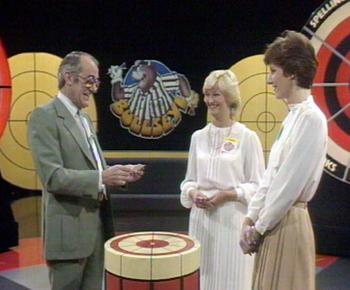 Jim Bowen interviews the contestants. The Round 1 dartboard can be seen in the background.
Jim Bowen interviews the contestants. The Round 1 dartboard can be seen in the background.Take aim...
In Round 1, the dart player would aim for one of ten segments on a specifically constructed board. Money was won depending on how close the dart came to hitting the bullseye - but only if the dart landed in the category nominated by the non-dart player. More money could be won by the non-dart player answering a question on the category associated with the segment. Once a category had gone, the dart player had to avoid it otherwise no money could be won in subsequent throws.
After each player had thrown one dart three times, the couple with the least amount of money retired. (This final rule was changed in series eight so that two teams were eliminated at the end of Round 2 to give the lagging team a chance to catch up.) The consolation prize was a Bendy Bully, a toy version of the show's portly bovine mascot. Oh, and some darts, tankards (goblets for the ladies), and in the early shows, before the Bendy Bullies, chalk-holders (don't ask!).
In Round 2, a standard dart board was used. Each dart-player threw three darts. The highest scoring dart player would win the right for his partner to answer a question, the reward being the dart player's score in (British) pounds from series 2 onwards. In the very first series, the winning score allowed their partner a choice of three questions: one worth £25, one worth £50 and one worth £101.
What's Bully got in store tonight?
After an interlude where a professional darts player (or sometimes a celebrity from the world of showbiz, who was always given a 60-point head start) tries to throw for money for a charity (known as "Bronze Bully Time", because the professional who scored the most at the end of the series got to hold a large Bully trophy made from bronze for the year - nine darts with pounds for points going to charity, doubled if they made 301 or more), the highest scoring team went through to Bully's Prize Board, another specially constructed dart board containing eight quite narrow red segments (which claimed prizes), quite large black segments (which did nothing) and a fairly large bullseye. Hitting a red segment corresponded with claiming one of eight prizes, and hitting the bullseye claimed Bully's Special Prize.
One jeopardy, which happened quite a lot more than you might think, occurred when a dart hit the same red segment or the bullseye twice. This caused the prize to be lost or, as the host infamously put it, "Keep out of the black and in to the red, There's nothing in this game for two in a bed".
Are they going to gamble?
After Jim had listed the prizes that the couple had won, the couple were given the option of gambling these prizes against the Star Prize that was "hiding behind Bully". To win the gamble, they had to throw 101 or more on the standard dart board with six darts, three for the non-dart player followed by three for the dart player. From the eleventh series (1991-92) onwards, if the couple gambled, not only would their prizes be on the line, but also the money they had won in the earlier part of the show - failure meant that all they would get was their "BFH - Bus Fare Home". (The money for their charity was always safe, and rightly so, as were their Bendy Bullies, tankards/goblets and darts.)
If the couple decided not to gamble for the Star Prize, they were sent on their way with a round of applause, and the second-placed couple were then brought back on set and given the option of gambling their money from the earlier part of the show. If they too declined to gamble, the third-placed couple were brought back and given the same option. Almost all of the time, either of these couples would say "yes", as putting a few quid on the line to win a speedboat was less of a gamble than potentially throwing away a washing machine and a hi-fi. There were, however, two occasions when all three couples declined to gamble and happily took home what they had won, meaning that the 101 challenge was not played at all: the first occasion was in 1984, when the Star Prize was a caravan, and the second was in 1987 (though Jim incorrectly stated it was "the first time in seven series"), when the Star Prize was a dining suite.
Before the darts were thrown, it was de rigueur for announcer Tony Green (pictured) to say "Take yer time" more often than necessary. If they won the star prize they got to keep their money and prizes from Round 3 too.
For their time, the prizes on Bullseye were very generous. Speedboats, cars, holidays and caravans would feature regularly. But, if the contestants failed in the final gamble, they had to see the star prize regardless - "Look at what you could have won."
Super, smashing, great
Bullseye had started out life as an Autumn replacement for The Krypton Factor at 7pm on Mondays. A year later it moved to Sunday afternoons through the winter months, where it would remain for the next decade. For its final couple of series, Bullseye was moved to a graveyard slot on Saturday afternoons. Bullseye became both a game show and an institution, peaking in with 17.60 million viewers on 23 December 1984. Club comedian Jim Bowen's style and catchphrases such as "super, smashing, great" spawned a large number of mickey-takes (not to mention the odd notable out-take on It'll be Alright on the Night).
Darting into the 21st century
The show was revived in 2006 with Dave Spikey as host. It was certainly a very decent revival, with only a few minor tweaks, such as 'Bullseye' T-Shirts, board games and DVD games being added to the consolation prizes, the value for the bullseye being hit on the category board dropping from £200 to £150 (be fair, this was Challenge!) and the star prize now being hidden 'behind our dartboard doors' rather than 'behind Bully'. Spikey certainly proved a good host, and it was good to have Green (still wearing jumpers) return as scorer, but it seemed that the revival didn't quite click with the public in the way the original version had - they apparently missed Bowen.
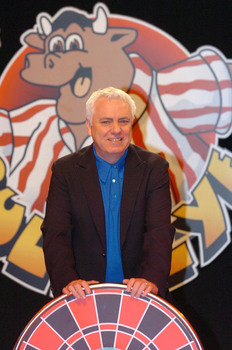 New host, Dave Spikey behind a contestant's podium.
New host, Dave Spikey behind a contestant's podium.A one-off revival for Epic Gameshow in 2020 featured a new final round. "101 or more in six darts" was gone, replaced by "hit these red sections on spinning dartboards". Much more drawn out, but didn't have the same charm.
Key moments
There were two bits of music played out over the credits - a jolly upbeat tune if the players won Bully's Star Prize, and a rather more downbeat one if they lost. These were accompanied by Bully appearing on the right of the screen, either grinning and giving a 'thumbs up', or covering his eyes in despair respectively.
It was painful when the non-dart player scored 60 or 70 with some jammy throws, before the supposed dart player blew it by throwing one single or treble 1 too many.
And it was very exciting when the non-dart player achieved the 101 with just two throws...
Proof, if proof were needed, that *anyone* could throw 101 or more.
Another team who got the star prize on two throws were Des Ackerman and Trevor Brownley in 1986. Trevor, the non-dart player, scored two treble 20's on his first two darts winning them the star prize. When they were interviewed as part of the mini documentary featured in the 2007 Gameshow Marathon reboot, Trevor laughed as he recalled: 'I was standing with the other dart in my hand thinking, There's a 180 on here!'
On one occasion, one couple won over £1,000, but the scoring could only accommodate three digits. So they manually stuck a "1" on a piece of card on the front of their desk.
Outtake ahoy: Bowen once asked "In which state of the United States was President Kennedy assassinated... in Texas?"
Catchphrases
From 1984 to 1995, the show started with Tony Green crying out, "It's a bulllllseye! And here's your host - Jiiiim Bowen!" For the Gameshow Marathon one-offs and the Challenge revival, Tony cried out the same thing but with the host's name changed accordingly. In the early series, Tony (and Nick Owen before him) would simply announce: 'Ladies and Gentlemen, please welcome your host for the evening - Mr. Jim Bowen.' Doesn't sound the same somehow, does it?!
Jim Bowen:
"Keep out of the black and in the red, nothing in this game for two in a bed."
"Look at what you could have won."
"Now the cash you won for charity earlier... that's safe."
"In you come, boys!"
"Super, smashing, great", and "loovely" was also used at times - (somewhat apocryphal - Bowen said 'smashing' and 'loovely' as a reflex action after one contestant revealed that he'd been made unemployed). The story there goes that Bowen, having been a stand-up comic, was far more used to looking for camera angles than to listening to what the contestants were saying to him.
"You win nothing but your BFH... Bus Fare Home"
(into the ad break) "I've got £___ here and it'll take me two minutes to count out."
"...And the category's gone, so I can't ask the question!"
"All for the throw of a dart"
"Go for your lights" (in the prize board round - although this changed after a while. In other series, the lights represented what they had won)
"You've got the time it takes for the board to revolve..."
"Up to the oche - and listen to Tony!"
"You can't beat a bit of Bully!"
"Bully's bellowed you out there!"
"Let's check that with Bully" (for the spelling category)
"The subjects that are lit are the ones you can hit!"
"Over there, the people that throw, and over there, the people that know" and variations thereof, referring to the dart players and the question answerers before the game began.
Tony Green:
"Iiiiiiin one...", "Iiiiiiin two..." and so on up to "Iiiiiiin eight..."
"And Bully's Special Priiiiize..."
"That's the bullseye!"
"Take yer time"
At the Prize Board: "That's red - it's number [whatever]", and "That's black"
"Three darts left - make them count."
Dave Spikey:
"You've had a good day out, but you'll go home wi' nowt!" (essentially, Dave's equivalent of Jim's BFH line)
"Throwers and knowers" (not nicked from Jim whatsoever, oh no)
"They risked it, they missed it!" (oh no, they didn't get the speedboat)
Finally, couples declining the 101 gamble would usually say "We've had a lovely day, and we'll let someone else have a go" or a variation thereof.
Inventor
Devised by Andy Wood and Norman Vaughan.
Theme music
John Patrick
Trivia
Jim Bowen claimed that he was the producer's fifth choice of host. The first three turned it down and the fourth said he'd check his diary.
The first two programmes were so bad they were scrapped and never broadcast - they were very expletive-ridden, by all accounts. This was especially expensive because a car had been won in one of them.
Tony Green made his debut appearance in 1981 during the first series as a charity thrower and became the show's scorer the following year; he was a very welcome addition to the show, for both Bowen and the viewers, but Bowen in particular, as he found it hard enough to get used to hosting a quiz show without also having to calculate what the darts players had scored. He and Green had an excellent rapport and proved quite a double act, and the latter also did so with Dave Spikey on the revival. Green originally used to wear a suit and tie like Bowen did, but later became known for wearing jumpers - not quite on the scale of either David Coleman on A Question of Sport or Noel Edmonds on Telly Addicts, but still quite a collection. Mind you, such attire was certainly very synonymous with the 1980s and 1990s.
By the end of its original run, the show was getting 12,000 applications a year and there was a five year waiting list just to sit in the audience!
A celebrity Christmas special in 1986 included Fatima Whitbread - javelins/darts, you see? A previous Christmas edition, in 1984, had featured Tommy Boyd; Kathy Staff, best known as the formidable Nora Batty in Last of the Summer Wine; and Margaret Harris, who was that year's Mastermind champion. It was hardly surprising that Harris proved adept at answering questions, but it was certainly quite a revelation to discover that her darts-skills were also impressive. The 1984 Christmas special also achieved the show's highest viewing figures ever, no less than 17.6m viewers.
Why so many speedboats? In certain series, the producers had done a deal with a speedboat manufacturer so there were actually two prizes hidden behind Bully - one was a speedboat if you won, and the other was Random Prize X if you lost.
In the first series, when contestants hit the green segments (which were changed to black from series 2 onwards) of the prize board, they'd win a booby prize, but, in keeping with the 'nothing in this game for two in a bed' rule, would also lose the prize if they hit the same segment again. The booby prize concept was also used in other shows, such as Take Your Pick, Steal and Wipeout. In truth, it worked better in those shows than in 'Bullseye', so it did not last very long in this case.
Five-times World Darts Champion Eric Bristow holds the record score for the nine charity darts with 380. Mike Gregory managed to match this feat. Update: Dartist Kevin "The Undertaker" Thomas writes to us thus: Just to correct you on the highest charity score, Welshman Alan Evans hit a remarkable 401 in the very early days of Bullseye. He scored 180, 180, 41. You can check that if you like, but I have this episode on tape and it's a fact. They said 380 was the record on Ant & Dec too which was incorrect. See for yourself. The debate rages on!: Robin Carmody writes: I saw the Alan Evans episode on Challenge recently. It came from the 1984-85 series, before the Bronze Bully had been introduced and when a celebrity would have nine darts (with a start of 60) every other week. The thing was that Evans' last treble 20 actually fell off the board, but had clearly hit the treble 20 beforehand. This was, strangely, not actually referred to; no doubt they allowed it to stand so that he could have two 180s. Perhaps they later revised this down to 341, therefore making 380 the record, or perhaps they only count scores after the arrival of the Bronze Bully.
In early series, Jim usually mentioned the ITV region from whence the contestants hailed, except if they came from Northern Ireland when it was always "over the water".
If the first couple didn't take the prize gamble, and the other two couples had each won the same amount of money, then both teams would be brought out and asked in turn whether they wanted to gamble. If they both said 'yes' there'd be a tie-breaker with the dart players each throwing three darts at the board, the highest scorer winning.
Bullseye also gave its name to a made-for-television darts tournament on BBC2 (think Pot Black, with arrows replacing balls) which ran for two series in 1980 and 1981, and with another regular quiz host, Peter Purves, as commentator. The ITV show began less than three weeks after the BBC show ended.
One contestant on the Dave Spikey version thought that every country had its own sun.
The signature tune was voted the best game show theme in a 2008 survey for Churchill Insurance.
The show has been produced in a number of locations over the years. It was first produced at ATV Centre/Central House at Bridge Street in Birmingham before being moved to Central's purpose built studios at Lenton Lane in Nottingham. The Challenge version was produced at YTV at Kirstall Road in Leeds and the Gameshow Marathon versions were produced at LWT's famous studios on the South Bank in London. Well, where Bully goes, Tony follows!
In 1983, the makers of Bullseye put together a very special "late-night" edition of the show for the Central Television Christmas tape. For those of you not in the know, "Christmas tapes" were tapes produced in the 1970s and 80s by bored and possibly jaded VT editors from the BBC and ITV regions who had to work on Christmas day (how else are people meant to watch Morecombe and Wise on the 25th?), compiled over the course of the year for viewing on the big day. To begin with these would usually comprise of X-rated bloopers (the kind you see on TV's Naughtiest Blunders 782 these days), but over time programme makers would make clips especially for the tapes. The most infamous is almost certainly the "Rude Rainbow" clip, an innuendo-filled mini-episode of children's favourite Rainbow written by the voice of Zippy and George, Roy Skelton, but a close second would be this Bullseye clip. In just under three minutes we get a foul-mouthed Jim Bowen in a stained string vest, Bully with a bout of flatulence, Tony Green as a semi-naked blind man (honestly, we're not making this up) and contestants from Cockermouth (ho ho) answering questions about vasectomies and gay cannibals. Then there's the, ahem, "laddish" language. It was, as they say, a different time... We are, of course, a family friendly website, but if you're that way inclined you can find it quite easily on YouTube.
A 1989 episode turned up as evidence in a 2011 murder trial. The accused had been a contestant on the show shortly before the crime took place, and the episode was used as evidence that his appearance at the time matched the description of the culprit given to police. John Cooper was found guilty of two double murders as a result. Not too unlike something that happened following an edition of What's My Line? many years earlier - see under that entry.
According to a 1990 episode, the eight dartists on Bully's bus in the opening credits were Eric Bristow, Keith Deller, Cliff Lazarenko, Bob Anderson, John Lowe, Dave Whitcombe, Jocky Wilson and Mike Gregory.
Merchandise
A Bullseye board game was made, and reissued in 2005. The original version was actually given away as an additional prize to the winning couples during an early series, with Jim referring to it on screen with their winnings from the prize board, calling it Bully's game.
Web links
Pictures
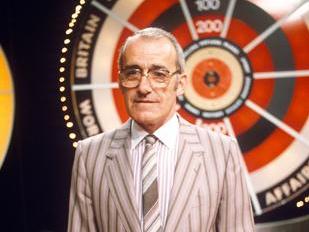 Jim Bowen in front of the dartboard.
Jim Bowen in front of the dartboard.See also
Weaver's Week reviews: the 1984 series | the Challenge revival

